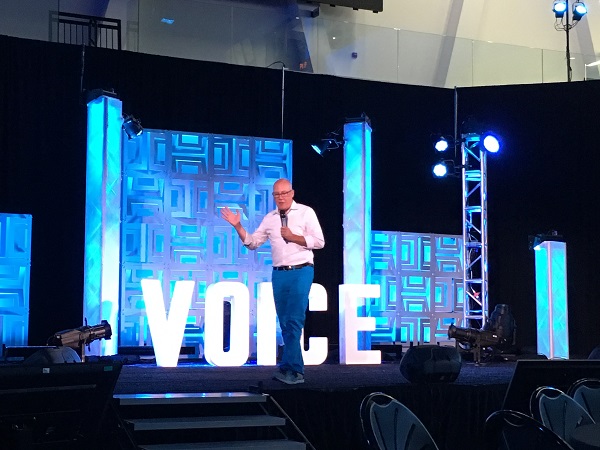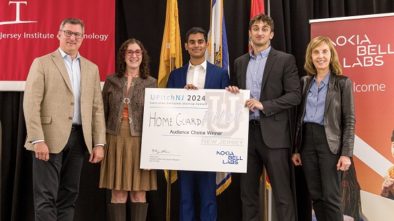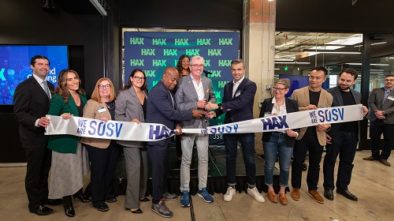Interview: Pete Erickson of Modev, Who’s Bringing the VOICE Summit Back to Newark in July
As many in the New Jersey tech community realize, the VOICE Summit is returning to Newark in July. This represents a major feather in the cap for Newark and for NJIT, which has already shown its ability to host major tech events.
Last year, registrations neared 3,000, which was double the number the organizers expected. We spoke in January with Pete Erickson, VOICE creator and founder of Modev (McLean, Va.), which organizes tech-related events, about what the company had learned from putting on last year’s summit and what new events and sessions the attendees can expect this year.
NJTW: What lessons did you learn from last year’s Summit?
Erickson: Anytime you do a new event, there is a lot to learn. For example, we learned a lot of positive things about the voice industry and who is a part of it. We hadn’t billed this as an international conference, but we had people from 15 countries attend the event. We also initially planned for 1,500 people, but we had almost 3,000. We learned there was a great demand for voice technologies and voice expertise, as people try to figure out this new interface.
NJTW: What did you learn about Newark and NJIT?
Erickson: We learned that Newark is a great destination for the conference, and we were validated in our choice of making Newark the home for the VOICE Summit. That’s why we are coming back. We learned that NJIT is a great university. I didn’t know NJIT well at all before this. We learned about this great institution and how special it is. The investment in the Wellness and Events Center was a smart thing to do. Without that investment, we probably wouldn’t have chosen NJIT as a home for the VOICE Summit. We also learned a lot about the space, and we plan to make better use of it this year.
NJTW: Are you worried about bringing 5,000 people at once to NJIT?
We are thrilled to be coming back to Newark and to be partnering again with NJIT. NJIT has 12,000 students, but we are coming in the summer, when many are away. Also, the way we have the programming scheduled, those 5,000 won’t all be on campus at the same time. They will roll through. If you are there for healthcare, you’ll come at one time, and if you are there for something else, you’ll arrive at another. That’s how we will manage the crowd with the content, and there will be a nice flow.
NJTW: Is there anything you would do differently at this year’s event compared with last year’s?
Erickson: Well, we didn’t have enough food trucks and the lines were really crowded, so we are addressing our catering and beverage issues.
Also, last year we wanted to accept a lot of talks because this was a new space and we wanted to hear what people would say. It’s hard to evaluate talks the first year of a conference in a new ecosystem like this. You want to give voice to a lot of people in a new ecosystem. But it was hard for people to get around the event because there was so much content and we didn’t give enough breaks between sessions so they could get to places. This year there will be less content. We are choosing between 100 and 125 speaking submissions and we are giving special invitations to speakers to be part of the program. There will be more time between sessions to get around. The keynote stage will run from 9 to 11 a.m. for panels, speakers and guests.
NJTW: What else will be new in terms of programming?
Erickson: We are adding in new activations that we think will be a lot of fun, like a hackathon on the Monday before the conference starts. It will be the largest voice-based hackathon in the world. We are having an awards dinner on Wednesday night that will feature at least 12 different awards, sort of like the Academy Awards. We are also adding a voice challenge, which will take place in the 90 days leading up to the conference. Sponsors can put out a challenge, teams can answer those challenges, and the challenge winners will be announced at the awards dinner as well.
NJTW: Last year, much of the programming centered on Alexa, and we know that Amazon is a major sponsor. Will there be more diversified content this year?
Erickson: Last year centered on Alexa, and that was indicative of the fact that Alexa was first to market in this space. Google has come on strong this year and Microsoft has an interesting play in this market, and we will have content from them. Others are entering the market. We expect a lot more technical content and the opportunity for attendees to get to know other platforms. Some of these do interact with Alexa and Google Home, so we’ll talk about interoperability and have multi-platform discussions such as on how Sonos works with Alexa and Google Home.




